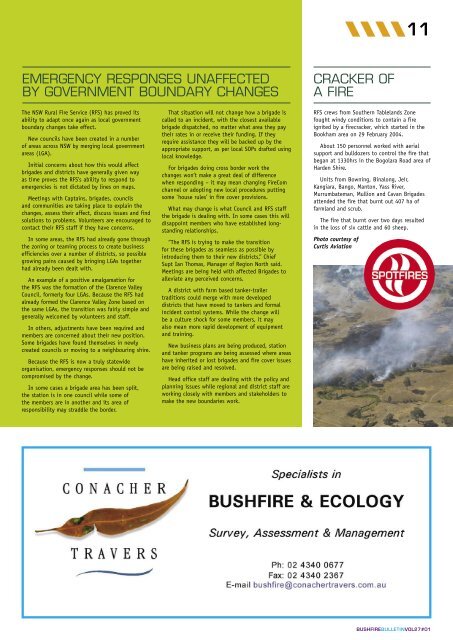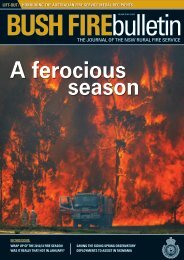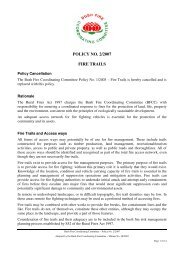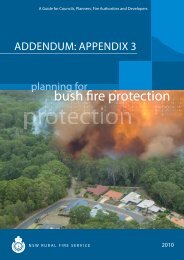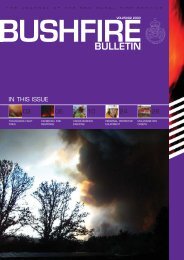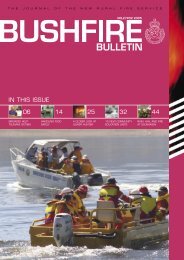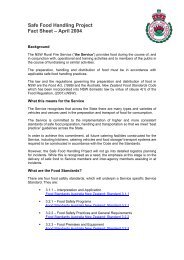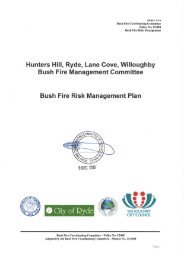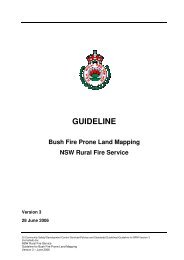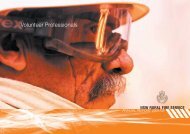to view - NSW Rural Fire Service
to view - NSW Rural Fire Service
to view - NSW Rural Fire Service
You also want an ePaper? Increase the reach of your titles
YUMPU automatically turns print PDFs into web optimized ePapers that Google loves.
11<br />
EMERGENCY RESPONSES UNAFFECTED<br />
BY GOVERNMENT BOUNDARY CHANGES<br />
CRACKER OF<br />
A FIRE<br />
The <strong>NSW</strong> <strong>Rural</strong> <strong>Fire</strong> <strong>Service</strong> (RFS) has proved its<br />
ability <strong>to</strong> adapt once again as local government<br />
boundary changes take effect.<br />
New councils have been created in a number<br />
of areas across <strong>NSW</strong> by merging local government<br />
areas (LGA).<br />
Initial concerns about how this would affect<br />
brigades and districts have generally given way<br />
as time proves the RFS’s ability <strong>to</strong> respond <strong>to</strong><br />
emergencies is not dictated by lines on maps.<br />
Meetings with Captains, brigades, councils<br />
and communities are taking place <strong>to</strong> explain the<br />
changes, assess their affect, discuss issues and find<br />
solutions <strong>to</strong> problems. Volunteers are encouraged <strong>to</strong><br />
contact their RFS staff if they have concerns.<br />
In some areas, the RFS had already gone through<br />
the zoning or teaming process <strong>to</strong> create business<br />
efficiencies over a number of districts, so possible<br />
growing pains caused by bringing LGAs <strong>to</strong>gether<br />
had already been dealt with.<br />
An example of a positive amalgamation for<br />
the RFS was the formation of the Clarence Valley<br />
Council, formerly four LGAs. Because the RFS had<br />
already formed the Clarence Valley Zone based on<br />
the same LGAs, the transition was fairly simple and<br />
generally welcomed by volunteers and staff.<br />
In others, adjustments have been required and<br />
members are concerned about their new position.<br />
Some brigades have found themselves in newly<br />
created councils or moving <strong>to</strong> a neighbouring shire.<br />
Because the RFS is now a truly statewide<br />
organisation, emergency responses should not be<br />
compromised by the change.<br />
In some cases a brigade area has been split,<br />
the station is in one council while some of<br />
the members are in another and its area of<br />
responsibility may straddle the border.<br />
That situation will not change how a brigade is<br />
called <strong>to</strong> an incident, with the closest available<br />
brigade dispatched, no matter what area they pay<br />
their rates in or receive their funding. If they<br />
require assistance they will be backed up by the<br />
appropriate support, as per local SOPs drafted using<br />
local knowledge.<br />
For brigades doing cross border work the<br />
changes won’t make a great deal of difference<br />
when responding – it may mean changing <strong>Fire</strong>Com<br />
channel or adopting new local procedures putting<br />
some `house rules’ in fire cover provisions.<br />
What may change is what Council and RFS staff<br />
the brigade is dealing with. In some cases this will<br />
disappoint members who have established longstanding<br />
relationships.<br />
“The RFS is trying <strong>to</strong> make the transition<br />
for these brigades as seamless as possible by<br />
introducing them <strong>to</strong> their new districts,’’ Chief<br />
Supt Ian Thomas, Manager of Region North said.<br />
Meetings are being held with affected Brigades <strong>to</strong><br />
alleviate any perceived concerns.<br />
A district with farm based tanker-trailer<br />
traditions could merge with more developed<br />
districts that have moved <strong>to</strong> tankers and formal<br />
incident control systems. While the change will<br />
be a culture shock for some members, it may<br />
also mean more rapid development of equipment<br />
and training.<br />
New business plans are being produced, station<br />
and tanker programs are being assessed where areas<br />
have inherited or lost brigades and fire cover issues<br />
are being raised and resolved.<br />
Head office staff are dealing with the policy and<br />
planning issues while regional and district staff are<br />
working closely with members and stakeholders <strong>to</strong><br />
make the new boundaries work.<br />
RFS crews from Southern Tablelands Zone<br />
fought windy conditions <strong>to</strong> contain a fire<br />
ignited by a firecracker, which started in the<br />
Bookham area on 29 February 2004.<br />
About 150 personnel worked with aerial<br />
support and bulldozers <strong>to</strong> control the fire that<br />
began at 1330hrs in the Bogolara Road area of<br />
Harden Shire.<br />
Units from Bowning, Binalong, Jeir,<br />
Kangiara, Bango, Man<strong>to</strong>n, Yass River,<br />
Murrumbateman, Mullion and Cavan Brigades<br />
attended the fire that burnt out 407 ha of<br />
farmland and scrub.<br />
The fire that burnt over two days resulted<br />
in the loss of six cattle and 60 sheep.<br />
Pho<strong>to</strong> courtesy of<br />
Curtis Aviation<br />
BUSHFIREBULLETINVOL27#01


